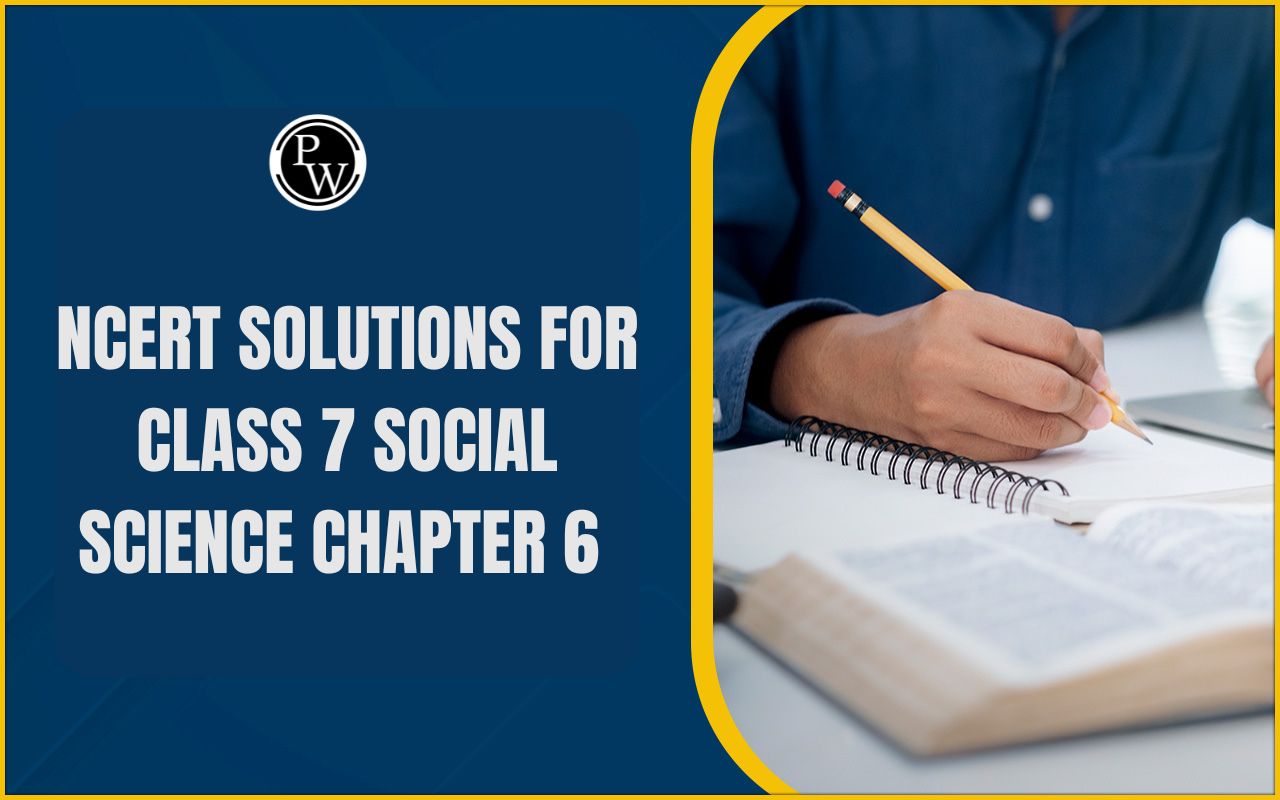
NCERT Solutions for Class 7 Social Science Civics Chapter 4
NCERT Solutions for Class 7 Social Science Civics Chapter 4: The NCERT Solutions for Class 7 Civics Chapter 4 offers a comprehensive understanding of the dynamics of growing up as boys and girls and how society perceives each gender. The PDF available for download on the main website facilitates easy comprehension of this chapter, aligning perfectly with the NCERT Solution for Class 7 Social Science Civics Chapter 4 on growing up as boys and girls.NCERT Solutions for Class 7 Social Science Civics Chapter 4 Overview
In NCERT Solutions Class 7 Civics Chapter 4, titled "Growing Up as Boys and Girls," students can access answers to the exercise questions. These solutions serve a dual purpose: they offer specific answers to individual questions while providing detailed insights into the topic. Crafted by subject experts, these NCERT Solutions undergo a thorough analysis of the syllabus and are aligned with the content of the NCERT book.CBSE Board Exam Centre List 2024
NCERT Solutions for Class 7 Social Science Civics Chapter 4 Growing Up as Boys and Girls
The key topics covered in NCERT Class 7 Social Science Civics Chapter 4, "Growing Up as Boys and Girls," include:- Understanding Gender: This section explores the concept of gender and the differences between biological sex and gender roles. It discusses how gender is socially constructed and the impact it has on individuals' lives.
- Roles and Responsibilities: The chapter delves into the traditional gender roles assigned to boys and girls in society. It examines how these roles influence behavior, expectations, and opportunities for individuals based on their gender.
- Challenges Faced: It highlights the challenges and stereotypes faced by boys and girls as they grow up. This includes issues such as discrimination, unequal access to education, and limitations on personal freedom based on gender norms.
- Gender Equality: The chapter discusses the importance of gender equality and the need to challenge gender stereotypes and discrimination. It emphasizes the right of every individual to equal opportunities and treatment regardless of their gender.
- Government Initiatives: The chapter also explores various government initiatives and policies aimed at promoting gender equality and empowering girls and women. It discusses the role of education, healthcare, and social welfare programs in addressing gender disparities.
- Impact of Gender Discrimination: The chapter examines the impact of gender discrimination on society as a whole, including its effects on economic development, social cohesion, and individual well-being.
- Changing Perceptions: It discusses the importance of changing societal perceptions and attitudes towards gender to create a more inclusive and equitable society. This includes challenging traditional gender norms and promoting positive role models for boys and girls.
| CBSE Syllabus Class 7 | |
| CBSE Class 7 English Syllabus | CBSE Class 7 Math Syllabus |
| CBSE Class 7 Social Science Syllabus | CBSE Class 7 Science Syllabus |
NCERT Solutions for Class 7 Social Science Civics Chapter 4 Important Questions With Answers
Here are some important questions along with their answers for NCERT Class 7 Social Science Civics Chapter 4: 1) What are the key differences between the experiences of growing up as boys and girls in different socio-cultural contexts? Answer: The experiences of growing up as boys and girls vary significantly based on socio-cultural factors such as societal norms, expectations, and opportunities. For example, in some cultures, boys may be encouraged to be assertive and dominant, while girls may be expected to be nurturing and submissive. Additionally, access to education, employment opportunities, and freedom may differ based on gender. 2) Discuss the challenges faced by domestic workers, particularly women, in society. Answer: Domestic workers, especially women, face various challenges such as low wages, long working hours, lack of social recognition, and exploitation. They often work in precarious conditions without job security or benefits. Balancing their work responsibilities with household duties can be overwhelming, limiting their opportunities for personal and professional growth. 3) What are some examples of women's work in society, and how does it contribute to gender inequality? Answer: Women's work includes unpaid care work such as childcare, cooking, cleaning, and eldercare, as well as paid work in fields such as domestic service, agriculture, and informal sectors. Gender inequality arises when women are disproportionately burdened with unpaid care work, limiting their access to education, employment, and economic opportunities. This perpetuates the cycle of gender inequality and reinforces traditional gender roles. 4) How do government initiatives and policies contribute to promoting gender equality and empowering women? Answer: Government initiatives and policies play a crucial role in promoting gender equality and empowering women. This includes measures such as providing access to education and healthcare, implementing laws to protect women's rights, promoting women's participation in decision-making processes, and implementing social welfare programs to support marginalized women. 5) Discuss the importance of challenging gender stereotypes and promoting gender equality in society. Answer: Challenging gender stereotypes and promoting gender equality is essential for creating a more inclusive and equitable society. It allows individuals to realize their full potential regardless of their gender and ensures equal opportunities and rights for all. By challenging stereotypes and promoting gender equality, society can break down barriers, reduce discrimination, and create a more just and prosperous world for everyone. These important questions cover key concepts and themes discussed in NCERT Class 7 Social Science Civics Chapter 4, providing students with a deeper understanding of gender dynamics and inequality in society.NCERT Solutions for Class 7 Social Science Civics Chapter 4 PDF Download
NCERT Solutions for Class 7 Social Science Civics Chapter 4 Short & Long Questions and Answers
Below are NCERT solutions for short and long questions from Class 7 Social Science Civics Chapter 4:Short Questions and Answers:
1) What is gender? Answer: Gender refers to the roles, behaviors, activities, and attributes that a particular society considers appropriate for men and women. It is a socially constructed concept that varies across cultures and societies. 2) What are some examples of gender stereotypes? Answer: Examples of gender stereotypes include the belief that women are naturally nurturing and better suited for caregiving roles, while men are inherently strong and suited for leadership positions. Other stereotypes include associating certain colors or activities with specific genders. 3) Why is it important to challenge gender stereotypes? Answer: Challenging gender stereotypes is important because it helps break down barriers and promotes gender equality. Stereotypes limit individuals' opportunities and can lead to discrimination and unequal treatment based on gender. 4) What are some challenges faced by domestic workers?
Answer:
Challenges faced by domestic workers include low wages, long working hours, lack of job security and benefits, and vulnerability to exploitation and abuse.
5) How can government initiatives contribute to empowering women?
Answer:
Government initiatives such as providing access to education, healthcare, and employment opportunities, implementing laws to protect women's rights, and promoting women's participation in decision-making can contribute to empowering women.
4) What are some challenges faced by domestic workers?
Answer:
Challenges faced by domestic workers include low wages, long working hours, lack of job security and benefits, and vulnerability to exploitation and abuse.
5) How can government initiatives contribute to empowering women?
Answer:
Government initiatives such as providing access to education, healthcare, and employment opportunities, implementing laws to protect women's rights, and promoting women's participation in decision-making can contribute to empowering women.
Long Questions and Answers:
1) Explain the concept of gender and how it is different from biological sex. Answer: Gender refers to the socially constructed roles, behaviors, and attributes that a particular society considers appropriate for men and women. It is different from biological sex, which is determined by physical characteristics such as reproductive organs. Gender is fluid and can vary across cultures and societies, while biological sex is determined by genetics. 2) Discuss the challenges faced by girls and boys growing up in different socio-cultural contexts. Answer: Girls and boys face various challenges growing up in different socio-cultural contexts. For example, in some societies, girls may face barriers to education and employment, while boys may face pressure to conform to traditional masculine norms. Gender-based discrimination and stereotypes can limit opportunities and perpetuate inequalities for bot girls and boys. 3) Examine the impact of gender inequality on society and individuals. Answer: Gender inequality has far-reaching consequences for society and individuals. It can lead to unequal access to resources and opportunities, limit economic growth and development, and perpetuate cycles of poverty and exclusion. Gender inequality also affects individuals' mental and physical well-being, leading to stress, discrimination, and violence. 4) Discuss the role of education in promoting gender equality and empowering women. Answer: Education plays a crucial role in promoting gender equality and empowering women. It helps challenge stereotypes, build critical thinking skills, and promote awareness of gender issues. Education also provides girls with opportunities for personal and professional growth, improving their socio-economic status and enabling them to participate more fully in society. These NCERT solutions cover key concepts and themes from Chapter 4 of Class 7 Social Science Civics, providing students with a deeper understanding of gender dynamics and inequality in society.NCERT Solutions for Class 7 Social Science Civics Chapter 4 Exercise Questions
1) Are the statements given alongside true or false? Support your answer with the use of an example.(a) All societies do not think similarly about the roles that boys and girls play.
(b) Our society does not make a distinction between boys and girls when they are growing up.
(c) Women who stay at home do not work.
(d) The work that women do is less valued than that of men.
Solution: (a) True. Example: In some societies, boys are expected to be assertive and dominant, while girls are encouraged to be nurturing and submissive. (b) False. Example: From an early age, boys are given toys like cars and guns, while girls are given dolls, indicating societal distinctions. (c) False. Example: Women who stay at home perform household chores like cooking, cleaning, and childcare, which constitute work. (d) True. Example: Despite performing a significant amount of unpaid labor, women's work is often undervalued and not given the same recognition as men's work. 2) Define 'invisible', 'physically demanding', and 'time-consuming'. Give examples.- Invisible: Work that is not noticed or acknowledged by others. Example: Housework like cooking and cleaning.
- Physically demanding: Work that requires physical strength and effort. Example: Carrying heavy loads or washing clothes by hand.
- Time-consuming: Work that takes up a significant amount of time. Example: Cooking meals for a large family or cleaning a big house.
- Boys: Cars, guns, action figures, sports items.
- Girls: Dolls, cooking items, dollhouses, fashion toys.
- Reasons for difference: Societal expectations and gender stereotypes. Toys are often designed based on perceived gender roles, reinforcing societal norms about appropriate behavior for boys and girls. This can influence the roles children are expected to play as adults.
- Shanthi, a domestic worker, lives in Bangalore with her husband and daughter. She works from 7:30 AM to 6:00 PM, diligently completing household chores. Despite long hours and low pay, she takes pride in her work and cares for her family. Her husband makes wax mannequins for a living, and together they strive to provide for their family.
- Cars
- Action figures
- Sports equipment (football, basketball)
- Building blocks
- Dolls
- Kitchen sets
- Dress-up costumes
- Tea sets
NCERT Solutions for Class 7 Social Science Civics Chapter 4 Summary
Chapter 4 of NCERT Class 7 Social and Political Life – II, titled "Growing Up as Boys and Girls," delves into the experiences of individuals growing up in different socio-cultural contexts and explores the dynamics of gender roles and equality. Here's a detailed summary of the key topics discussed in the chapter:1) Growing up in Samoa in the 1920s:
The chapter begins by examining the experiences of young girls and boys growing up in Samoa in the 1920s. It discusses how traditional Samoan society provided more freedom and opportunities for girls compared to many Western societies. Girls were encouraged to be assertive, independent, and actively participate in community life.2) Growing up male in Madhya Pradesh in the 1960s:
The chapter then shifts focus to the experiences of boys growing up in Madhya Pradesh in the 1960s. It highlights the social expectations and pressures faced by boys to conform to traditional masculine norms, including being strong, dominant, and the primary breadwinners of the family.3) Lives of domestic workers:
The chapter explores the lives of domestic workers, primarily women, who often face exploitation, discrimination, and lack of recognition for their labor. It discusses the challenges they encounter in balancing their work responsibilities with household duties and emphasizes the need for better working conditions and social recognition for domestic workers.4) Women’s work and equality:
The chapter examines the concept of women's work and the unequal distribution of labor based on gender roles. It discusses how women are often burdened with unpaid care work, such as childcare and household chores, which limits their opportunities for education, employment, and economic independence. It emphasizes the importance of gender equality in sharing domestic responsibilities and promoting women's empowerment.5) Government Initiatives:
The chapter also discusses various government initiatives and policies aimed at promoting gender equality and empowering women. It highlights the role of education, healthcare, and social welfare programs in addressing gender disparities and improving the lives of women and girls. In summary, Chapter 4 provides a comprehensive exploration of the experiences of individuals growing up as boys and girls in different socio-cultural contexts. It examines the challenges and opportunities associated with gender roles and highlights the importance of promoting gender equality and empowering women to create a more inclusive and equitable society.NCERT Solutions for Class 7 Social Science Civics Chapter 4 FAQs
What is the concept of gender discussed in Chapter 4?
In Chapter 4, the concept of gender refers to the socially constructed roles, behaviors, and attributes that society considers appropriate for boys and girls. It explores how gender norms and stereotypes shape the experiences of individuals growing up as boys and girls.
Why is it important to challenge gender stereotypes?
Challenging gender stereotypes is crucial because these stereotypes can limit individuals' opportunities, perpetuate inequalities, and reinforce harmful gender norms. By challenging stereotypes, we can promote gender equality and create a more inclusive society where individuals are free to express themselves regardless of their gender.
What are some examples of gender inequality discussed in Chapter 4?
Gender inequality is evident in various aspects of life, including unequal access to education and employment opportunities, disparities in wages and household responsibilities, and societal expectations regarding gender roles and behaviors. These inequalities are discussed in Chapter 4 to highlight the challenges faced by individuals based on their gender.
How do government initiatives contribute to empowering women, as mentioned in Chapter 4?
Government initiatives play a significant role in empowering women by providing access to education, healthcare, and employment opportunities, implementing laws to protect women's rights, and promoting gender equality through social welfare programs and campaigns.
What are some common household tasks undertaken by women, and how do they contribute to gender inequality?
Women often perform a disproportionate amount of unpaid care work, including cooking, cleaning, childcare, and eldercare. These tasks are essential for maintaining households and supporting families but are often undervalued and unrecognized. The unequal distribution of household responsibilities contributes to gender inequality by reinforcing traditional gender roles and limiting women's opportunities for personal and professional development.
🔥 Trending Blogs
Talk to a counsellorHave doubts? Our support team will be happy to assist you!

Check out these Related Articles
Free Learning Resources
PW Books
Notes (Class 10-12)
PW Study Materials
Notes (Class 6-9)
Ncert Solutions
Govt Exams
Class 6th to 12th Online Courses
Govt Job Exams Courses
UPSC Coaching
Defence Exam Coaching
Gate Exam Coaching
Other Exams
Know about Physics Wallah
Physics Wallah is an Indian edtech platform that provides accessible & comprehensive learning experiences to students from Class 6th to postgraduate level. We also provide extensive NCERT solutions, sample paper, NEET, JEE Mains, BITSAT previous year papers & more such resources to students. Physics Wallah also caters to over 3.5 million registered students and over 78 lakh+ Youtube subscribers with 4.8 rating on its app.
We Stand Out because
We provide students with intensive courses with India’s qualified & experienced faculties & mentors. PW strives to make the learning experience comprehensive and accessible for students of all sections of society. We believe in empowering every single student who couldn't dream of a good career in engineering and medical field earlier.
Our Key Focus Areas
Physics Wallah's main focus is to make the learning experience as economical as possible for all students. With our affordable courses like Lakshya, Udaan and Arjuna and many others, we have been able to provide a platform for lakhs of aspirants. From providing Chemistry, Maths, Physics formula to giving e-books of eminent authors like RD Sharma, RS Aggarwal and Lakhmir Singh, PW focuses on every single student's need for preparation.
What Makes Us Different
Physics Wallah strives to develop a comprehensive pedagogical structure for students, where they get a state-of-the-art learning experience with study material and resources. Apart from catering students preparing for JEE Mains and NEET, PW also provides study material for each state board like Uttar Pradesh, Bihar, and others
Copyright © 2026 Physicswallah Limited All rights reserved.







